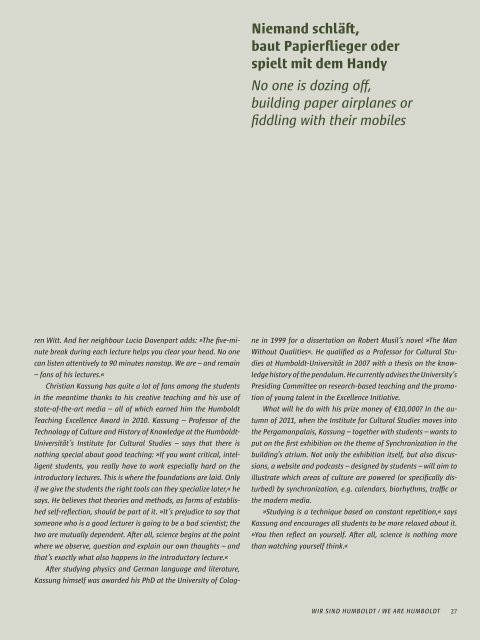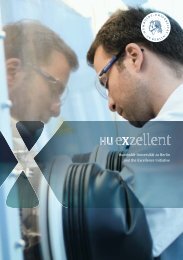hu wissen (pdf) - Exzellenzinitiative - Humboldt-Universität zu Berlin
hu wissen (pdf) - Exzellenzinitiative - Humboldt-Universität zu Berlin
hu wissen (pdf) - Exzellenzinitiative - Humboldt-Universität zu Berlin
Sie wollen auch ein ePaper? Erhöhen Sie die Reichweite Ihrer Titel.
YUMPU macht aus Druck-PDFs automatisch weboptimierte ePaper, die Google liebt.
en Witt. And her neighbour Lucia Davenport adds: »The fi ve-minute<br />
break during each lecture helps you clear your head. No one<br />
can listen attentively to 90 minutes nonstop. We are – and remain<br />
– fans of his lectures.«<br />
Christian Kassung has quite a lot of fans among the students<br />
in the meantime thanks to his creative teaching and his use of<br />
state-of-the-art media – all of which earned him the <strong>Humboldt</strong><br />
Teaching Excellence Award in 2010. Kassung – Professor of the<br />
Technology of Culture and History of Knowledge at the <strong>Humboldt</strong>-<br />
<strong>Universität</strong>’s Institute for Cultural Studies – says that there is<br />
nothing special about good teaching: »If you want critical, intelligent<br />
students, you really have to work especially hard on the<br />
introductory lectures. This is where the foundations are laid. Only<br />
if we give the students the right tools can they specialize later,« he<br />
says. He believes that theories and methods, as forms of established<br />
self-refl ection, should be part of it. »It’s prejudice to say that<br />
someone who is a good lecturer is going to be a bad scientist; the<br />
two are mutually dependent. A� er all, science begins at the point<br />
where we observe, question and explain our own thoughts – and<br />
that’s exactly what also happens in the introductory lecture.«<br />
A� er studying physics and German language and literature,<br />
Kassung himself was awarded his PhD at the University of Colog-<br />
Niemand schlä� ,<br />
baut Papierfl ieger oder<br />
spielt mit dem Handy<br />
No one is dozing off ,<br />
building paper airplanes or<br />
fi ddling with their mobiles<br />
ne in 1999 for a dissertation on Robert Musil’s novel »The Man<br />
Without Qualities«. He qualifi ed as a Professor for Cultural Studies<br />
at <strong>Humboldt</strong>-<strong>Universität</strong> in 2007 with a thesis on the knowledge<br />
history of the pendulum. He currently advises the University’s<br />
Presiding Committee on research-based teaching and the promotion<br />
of young talent in the Excellence Initiative.<br />
What will he do with his prize money of €10,000? In the autumn<br />
of 2011, when the Institute for Cultural Studies moves into<br />
the Pergamonpalais, Kassung – together with students – wants to<br />
put on the fi rst exhibition on the theme of Synchronization in the<br />
building’s atrium. Not only the exhibition itself, but also discussions,<br />
a website and podcasts – designed by students – will aim to<br />
illustrate which areas of culture are powered (or specifi cally disturbed)<br />
by synchronization, e.g. calendars, biorhythms, traffi c or<br />
the modern media.<br />
»Studying is a technique based on constant repetition,« says<br />
Kassung and encourages all students to be more relaxed about it.<br />
»You then refl ect on yourself. A� er all, science is nothing more<br />
than watching yourself think.«<br />
WIR SIND HUMBOLDT / WE ARE HUMBOLDT<br />
27



